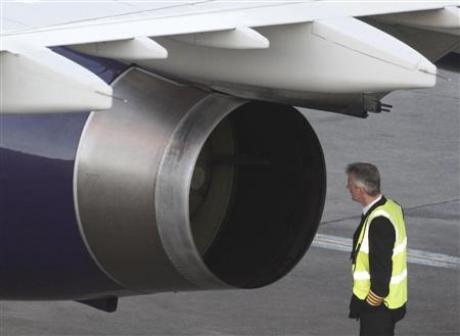Green Groups Point To Ash Cloud Silver Lining
Country: UK/NORWAY
Author: Gerard Wynn and Alister Doyle

A pilot looks at the jet engine of an airplane at
Manchester airport, northern England April 21, 2010.
Photo: Phil Noble
Iceland's erupting volcano has spewed plenty of ash but far less greenhouse gas than Europe's grounded aircraft would have generated.
Carbon dioxide emissions totaled 150,000 tonnes a day in the early days of the eruption, according to Durham University. That compares with 510,000 tonnes per day emitted when planes are flying as normal over the continent.
But experts cautioned it was hard to draw conclusions about the overall impact of pollution because more cars and buses were on the roads to help stranded travelers and the volcano is emitting a nasty cocktail of toxins.
Europe's skies were open for business on Wednesday after an ash cloud wrecked timetables for six days, stranding passengers and costing the airline industry $250 million a day. Ash can scour and even paralyze jet engines.
Planes add to global warming through emissions of carbon, other chemicals and their vapor trails, scientists say.
They also produce pollutants and noise around airports.
The first analysis of air quality around London's two busiest airports, Heathrow and Gatwick, showed that pollutants which can causes respiratory problems had plummeted, said the London Air Quality Network.
"That entire signal dropped to zero (from Thursday through Saturday)," said Ben Barratt at King's College London, who helps coordinate the Network's data, referring to nitrogen dioxide.
"The quality of life difference is mostly down to noise, and we're getting lots of emails saying how lovely it is," he added.
Aviation in 32 European nations emitted 510,000 tonnes a day of CO2 in 2007, according to the European Environment Agency. Assuming two-thirds of flights are canceled, that means a cut of 340,000 tonnes a day, not counting non-European carriers.
Colin Macpherson, a geologist at the University of Durham in England, estimated the volcano's initial emissions at 150,000 tonnes of CO2 a day, drawing on data from a previous eruption.
Northerly winds helped limit health damage from the Eyjafjallajokull volcano in Iceland, blowing the ash off-shore to Europe. And air quality in nations including Britain and Norway has been largely unaffected because little ash has reached the ground so far.
(Editing by Janet McBride)
© Thomson Reuters 2010 All rights reserved
